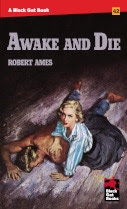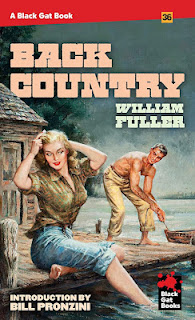9798860101
Stark House Press, 2023
178 pp
paperback
I just noticed that my last post here was in July. Ouch! On the other hand, July through September is usually spent reading the Booker Prize longlist, and truth be told, I haven't read my usual volume of books this year. According to goodreads, it's just 70 to date, but with this book, Awake and Die, we can up that to 71.
In the brief author bio in the back of this book, we learn that Robert Ames is the pseudonym of Charles Lee Clifford (1890-1991), who wrote two other books under this name: The Devil Drives (1952) and The Dangerous One (1954). Memo to self: I need to have these. Awake and Die is part of Stark House's fantastic Black Gat collection, but was originally published in 1955, number 518 in the old Fawcett Gold Medal series. This Stark House reprint duplicates the cover of the Gold Medal edition, minus the blurb
"Murder was a pleasure and women were a pain."
Just to be very clear here, Awake and Die is not a whodunit; all you need to do is to read the basic outline laid out on the back cover blurb to know that this is not an armchair detective sort of thing. More importantly though, at the very beginning of the novel the narrator, Will Peters, wants the reader to judge whether he is a "cold-blooded killer" or if he "was off in the head," recounting events that take him up to the present day. As he also says, "it wasn't anybody's fault, except fate's," which in my opinion sort of also challenges the reader to decide whether or not that's how it was.
 |
| from Bookscans |
It seems that Peters had been injured during the war in Korea when a bullet had pushed a piece of his helmet into his head. After three operations, doctors finally managed to get it "all cleaned out." Being "an outside man," after his surgeries Peters makes his way home to New Jersey to a place called Bayhaven, where he works as a clamdigger; he is to report every couple of weeks "to be checked" by an Army Reserve doctor in the area. One day as he lifts his basket of clams out of his boat (to be given to the doctor, a Dr. Algee, as thanks), he notices a gorgeous woman who offers her help with the heavy load, and it seems to be a mutual, instant attraction. Claire Grace is her name, and after a while he learns among other things that she lives in the "richer part" of Bayhaven and that she's married. After they spend some time at a bar with a couple of drinks and a dance, she scoots off after Will invites her to his place, making the excuse of not realizing how late it was. Still, Will can't get his mind off of her, thinking that Claire was "the kind of woman a man ought to have."
When he finally makes it back to his place, he notices a light on in the house and thinks maybe Claire might have taken him up on his offer. The thought makes him "feverish," but it's only his former girlfriend Mae there, with her "brassy-dyed hair," her "glaring white makeup with bright-red lipstick" and her fake British accent, waving her cigarette around. As Peters notes, "it was remembering Claire Grace, and comparing her with this drunken babe, that so enraged me." Suffice it to say that this is the point when this story truly takes off, leaving bodies to pile up one after the other, a detective with a need to prove himself who will not give up under any circumstances, and yet another woman who could very easily put Peters in the big house for life.
Even though this is not a whodunit (as I noted earlier), there is more than enough here to satisfy any reader of older crime fiction, especially because of the many twists the author throws into the basic plot, some expected, some definitely not. Ames lays on the sleaze factor a bit thickly in this story, which given the time of its writing is not unusual, but on the flip side, he was a fine plotter and a pretty good writer, keeping me reading and not wanting to put the book down, tying up a lot of loose ends so that I wasn't left in the dark about anything. Evidently he was also not without a sense of humor. One of Peters' neighbors is an old recluse who speaks to others via his seagull, his dog and his cat, each with its own distinct personality and voice; it seems that any one of them (she says, tongue-in-cheek) could potentially make the rest of Will's life miserable. [I really had to chuckle at this bit -- my dog often answers me back or makes comments in a thick New Yawk accent when I'm feeling a bit silly.]
My many and very grateful thanks to Stark House for my copy -- I've just recently bought a couple of their books, Only the Good, by Mary Collins (1942) and a two-volumes-in-one edition of The Make-Believe Man (1963) and A Friend of Mary Rose (1961) written by Elizabeth Fenwick, but looking through the little book pamphlet included with those, I'm super, super excited about reading Jay Dratler's Pitfall, which they list as "First in a series of Film Noir Classics." I'm actually so stoked about that one that I'm going to go buy it now.
Awake and Die is a big yes for me and it should most certainly be for those people who enjoy indulging in crime from yesteryear. Recommended, definitely.









